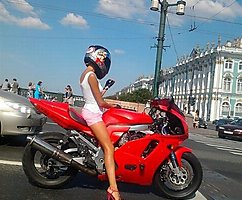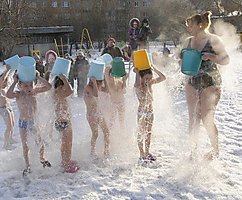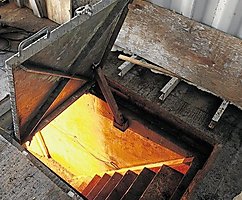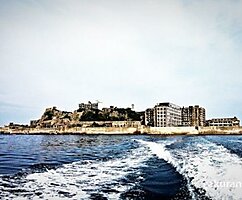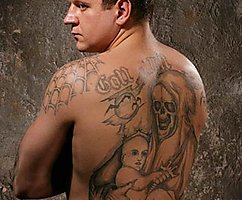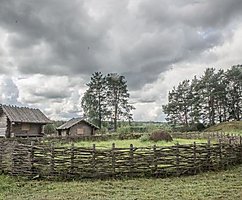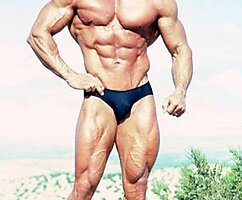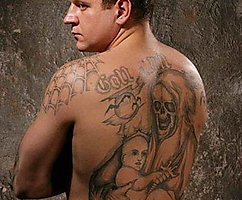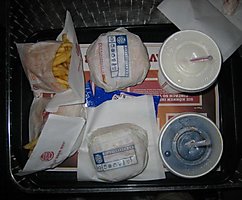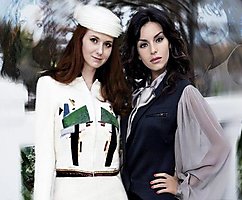Russian occupation
 Bashny.Net
Bashny.Net
Clear village is located very close to the EU to the border - only 5 kilometers. However, to the western standard of living of its inhabitants as the moon.
Even 75 years ago, the village was a Prussian city Kaukemenom with a 400-year history. It worked a few plants, a variety of shops, banks, restaurants, more than a dozen small hotels and one major five-star.
City Kaukemen went to the Soviet Union at the Potsdam Convention. And there was not one of the most war-torn. However, today the former splendor reminiscent of a centuries-old paving stones, old linden tree, elegant church that stands with no windows and no roof, so the house with tiled roofs. Today the village is clear - a dying town, the most hopeless throughout the Kaliningrad region. Residents flee from there, in the dilapidated houses wind howled ...

Half of the houses in the village. Clearly there are no roof. People live only in the first floor.
After the capitulation of Nazi Germany a large part of East Prussia, rich fertile land was transferred to the USSR. Including Kaukemen. The first thing the Soviets kicked out of all Germans. Towns and villages renamed: Königsberg became Kaliningrad Tilsit - Soviet, Heinrichswalde - Slavskoe, Kaukemen - clear. Then they began to settle in the city of immigrants from all over the Union.
From Kaliningrad to the Clear - 136 kilometers, getting there is difficult, it is necessary to go on three buses. The troop, berry, Krasnoznamenskaya ... Villages and towns flashed in front of me. Names do not tally with the scenery outside the window. Instead of the traditional Russian log houses with carved shutters - German houses with tiled roofs, neat alleys of old trees. Of the buildings of the Soviet era somewhere across typical Khrushchev, who are especially close look ugly with stone houses in the Prussian style, but concrete bus stops. Of the buildings of the new Russia - only roadside stalls. In almost all localities through which lay in my way clear, there is an old German pavers. Laid on the conscience, for centuries, it is in no way comparable with holes, somehow patched modern asphalt.
By the afternoon reached the Soviet (former Tilsit). Even 80 years ago, the Germans tied Tilsit and Kaukemen railway. But it was dismantled in the USSR, rails melted. Now the message - only car. The bus runs a couple of times a day.
Bathed in the warm March sun cobbled streets Clear meet me ringing emptiness. On the streets - not a soul. Old, beautiful church square. Judging by the photos of a century ago, her once crowded city dwellers, seething life, every Wednesday there were large agricultural fairs. Today, in 2015, I saw her only three guys. From vodka and seeds they kuchkovalis at the monument to Lenin, painted in gold color. This is the local Communist tried: set Ilyich earlier this year. Now political idol of the USSR with a smile looking at the crumbling house and moldy tile roofs.
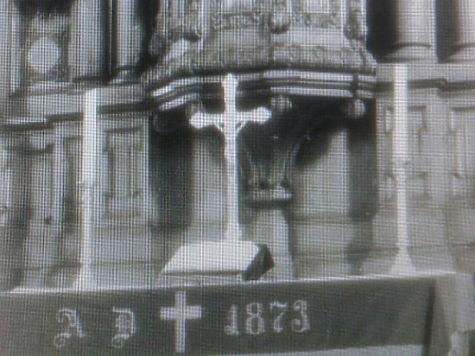
Old Lutheran Church. Beginning of the XX century ... Photos from the personal archive.
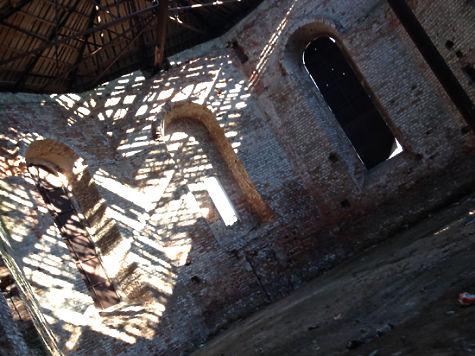
... And today.
The building is an old gothic church heavily damaged. Not War - just him no one was watching. Church on this site was built back in 1549. Later it was rebuilt several times, until by 1702 has not begun construction of a stone building. The king of Prussia Frederick I allocated 225,000 bricks. Kirche put in 4 years. Today the church roof - solid holes, stairs to the bell tower, where once there were four bells, no more, and the organ was dismantled as early as 1947. Then claimed the shops (of seats in the church was 760, just as it was designed for 1,500 people). Past 30 years, the handiwork of men completed the wind, rain and snow. Someone dumped in a pile in the corner of old tires ...
Under Soviet rule in the church was the barn, then a warehouse. In the 80s there was a major fire - all burned. Since then, the 500-year-old Lutheran church is well worth it no one wants.
On the contrary - the once beautiful building of red brick with a "crown". Here the Germans was a parochial school. When the Soviet Union - a dairy farm. In recent years - pimped without a roof.
Surprisingly, in the village there are no clear structures of our times. All that is left over from Prussia. A number of houses, once tightly adjacent to each other, much thinned. And the remaining structure look like rotten teeth in old mouth. Shabby, with mold ... Modern paint and plaster peeling off, revealing signs in German. Here, it appears, was a bank here - shop car ... Former Bahnhofstrasse, now the street Tractor - one of the main streets, but in it there are only a couple of houses. But no! It is easy to include fantasy and imagine how luxurious look once these buildings ...
The locals are not so accustomed to visitors that saw me and immediately curiously peering out of windows:
- And you're not from zhilinspektsii? Come, I'll show you what we've got a nightmare!
Learning that the journalist, the woman immediately offers a "tour».
- Here we have a collective farm in the Soviet Union was communicating. Advanced, by the way, was the farm; over there, on the left, the stables were, they still Germans built. Already brick and left. And then there was the German school ... Oh, and the school was beautiful! I myself it comes to an end. Classes - huge, bright. But in '92 there was a fire. All burned to the ground. Gymnasium only stayed, he was in a separate building. The kids are still engaged in it. A new school was built, we are now here with pupils from all the surrounding villages, they are collected in a special school bus. If it were not for the school, there would be no one left at all. No work, nothing to live on. I interrupt what I can, keep the garden, in the fall selling potatoes. Eldest daughter went to live in Germany, sends a money sometimes. She, my Kate, when for the first time in Germany, then came home to clear, said to me: "Mom, what is the hole, it turns out, we live in ...»
In addition to the school burned down and a lot of other buildings. And no wonder: are heated by stoves in the winter, there is no gas in the city. Regular fires to put out no one: the fire station is not - it is also burned. There is not even a clear separation of the police - it is only in the neighboring Slavsk. Although the Germans were a fire squad and a police station, and even a brothel.
So that there is a brothel! By the early twentieth century in the German Empire these places were considered as protected, were climatic resort. Came here to relax, swim in the river Neman, hunting, fishing ... In the city, there were two luxury hotel, one of which - a five-star (from left magnificent buildings and stone), and another 10 smaller hotels.
Now it is hard to believe, but by the time when the city was taken by troops Kurkenezee 182nd Infantry Division of the 1st Byelorussian Front, there were 16 food stalls, 6 manufactory shops, bakeries 7, 7 of meat, 4 shoe, 3 shops Perfumery and haberdashery and pharmaceutical products, 6 joinery, manufacturing tinware 2, 3 building contractor, glassworks 2, 3 forge. In addition, there were several branches of banks, customs, court, mill, dairy plant, gas plant, textile factory ... And now all of the companies in the Clear left 4 shops and one cafe, which is open only on weekends.
- And what we buy something, the money no one - sigh local resident Alexander Starodubtsev. I met him at the grocery. He was born and raised in this city. Now working day after two Sovetsk. - Come on, I'll show you our home. He is here beside the street Postal. Our mnogokvartirnik, it turns out, is an architectural monument. It recently I accidentally found out when I went to swear on the roof. You see, we have changed a few years ago for some reason the roof. German old was - she did not flow. And this new - horror. It was demolished at the first strong wind ...
On the way, Alexander said that recently watched on television as the Governor of the Kaliningrad region reported to the President.
- He said that the average wage in the area - 28 thousand. I kind of money have never seen! I am working now in stock logistician. I receive so many that even ashamed to say. Sometimes I look photos of Clear hundred years ago. We on this do not even dream of! Here, where we now have a barn, on the second floor was a bakery. And on the first floor - a bakery ...
In the village there is a gas (at 5 km from the city, the river Neman in Lithuania it is, and Russian), there is no central sewage system, no roads are repaired, nothing is built. Although by 1924 it was electrified Kaukemene 95% of the homes and estates in the district. The city streets were also covered the latest at the time the way - with detectors dusk. In addition, in 1930, opened Tilzitshtrasse theater with 600 seats. Now there is no theater.
House on a street post, where he lives, Alexander, was once white. Now - dirty gray; visible at the end of a century-German inscription, advertises Konigsberg branch of the bank. In the attic there lives a local drunkard Sasha - put the iron bed, a TV tube. Around the dirt and stench. When I looked back, the owner-old man slept surrounded by stray dogs. Barking he woke up, opened one eye and Throaty shouted at me:
- In a coffin I will take pictures! ..
Neighbors told him that only 32 years old.
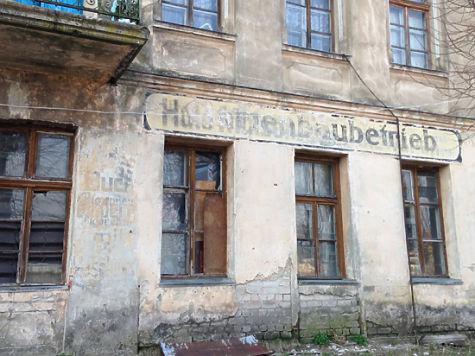
Why did the inhabitants of Prussia were both money and work, and food? Why East Prussia was an independent region of Germany and the Kaliningrad region became subsidized?
The same question is raised and ethnic inhabitants of these lands. Every year, usually in the summer, the German family, whose ancestors lived in these places come to visit their homeland. Find their home, watching the church ...
- How the Iron Curtain fell, so the Prussians were pulled here - says a resident of Clear Alexander burning. - They are immediately obvious: neat, come to rent a car, go in the house ... They are shocked by what he saw. Many cry, especially those who were taken away children - they remember how there was.
Now in this apartment three-storey building, with balconies offering a great view of the church, only three residential apartments. In the other - the devastation: windows smashed, plaster fell off, piles of garbage - so looks most apartments Clear. In order not settled homeless and accidentally set fire to the house, Alexander's it protects.
- If there lights up, then hell who come stew - he explains. - Why did not mend? Home something good and built to last. The walls are intact, is quite suitable and gender: a strong board, from walking not even bend. Even out balconies on the second floor of the German right. We write access wherever they can. Nothing helps!
To speak out in the yard, another resident a collapsed house:
- I was in the Baltic relatives - there the same time German house repaired. Well worth it. And we're not wanted ...
■ ■ ■
Director of the regional museum in the nearby district center with Clear Slavsk Svetlana Jackel says that they are working closely with the Germans.
- In Germany, there is a community of former residents Elhniderung - Tights Valley; they meet regularly, even publish the magazine of the same name. Every year they come at us in the museum exhibits bring. The Germans are very keen to preserve their heritage.
After dying village Clear neighboring town Slavsk (former Heinrichswalde) looks very lively. Although the city itself is much smaller and not so beautiful. But all functions, some of the buildings restored. First of all homes connected to gas. Together with the EU pave the public sewerage system. There was also hope to restore the church was facilities here.
Svetlana for me unlocks the padlock on the door of the church.
- A year ago, we were able to sign a lease with the ROC in the church building. Also managed to include this item in the Ministry of Tourism of the Russian Federation. Already there are design work - they have allocated 6 million rubles. On the first count it turns out that the restoration job needs about $ 100 million. The building of the former church, which was conceived to be a cultural center with a concert hall. Acoustics are smart, already tested by local musicians.
A year ago, at the entrance to set the memorial stone. It Slavskogo map area - the former leggings valleys, with names in Russian and German. And the inscription in two languages: "Unforgotten Motherland - East Prussia." This black stone set at its own expense a German, a former resident of Slavsk. His name was Hartmut Davidayt. But the man did not live up to the date of the monument, has died.
- We dream that our area has become a tourist attraction - says Svetlana plans. - Here we have something to show. Also - hunting, fishing. Monastery near chic, there already carry tours from Kaliningrad.
Svetlana told me that her mother in law moved to Slavskii area in 1947. And lived in Clear and in other cities and towns.
- He says he had a lot of luxury homes. And gorgeous parks, alleys ... People took the old German house. They were completely livable. Furniture, stoves, floors - everything was. But while all the German somehow not respected. Much burned, sold, tiles on the walls chipped and sold ...
A 5 km from the Clear River in the tiny village of Levoberezhny lives last veteran of the whole district - Kartseva Ekaterina Pavlovna. Recently, she has knocked 90 years. But she lives alone, holding a large garden. In the same village lives veteran sister - Olga Pavlovna. Hold two pensioners together, helping each other.
- Our family moved here in 1946. Oh, what a beauty, she was! I remember I went to the church and was dumbfounded: all in velvet, in gold. I am such and have never seen ... When moved here, you worked very hard. I was a schoolgirl, and after school we ran a grain sorting. There was no time even to sit down. And now no one works. Everything fell apart.
■ ■ ■
Only 70 years separate the city from the village Kaukemen Clear. But it is - an abyss. Our grandfathers shed blood here, fought for this fertile, rich and prosperous land. There is a mass grave of dead Soviet soldiers. All that got then in fierce battles, now is dilapidated, rotten, useless.
I have until the late evening wandering through the streets of the Clear - Kaukemena. All represented as they could walk here people drink coffee in the market square, there are fresh rolls from the bakery in the street Postal (formerly Lorkshtrasse). Could ride on the river Neman and waving from a boat on the shore of the Europeans. I have told friends: why do you need a weekend in Barcelona, go to clear! There's no worse.
After all is not lost: let half of the homes have collapsed, but that much is still left. Still alive ancient medieval streets, canals and bridges, still holding the church, not all people have left this place ... Just a decade all that stand no more. Unless a miracle happens.
REFERENCE "MK»
The first mention of Kaukemene dated 1532 year. Already in 1661 Kaukemen became a town with the right of the fairs. By the beginning of XX century the city was the largest settlement of the valley Elhniderung. A significant portion of the population and the surrounding area Kaukemena were ethnic Lithuanians. In 1938, Hitler issued a decree under which the settlements of East Prussia was renamed in the German way. Kaukemen became Kukernezee. But the new name of the city wore long. Kukernezee was taken Sovetskaya forces January 20, 1945. Since 1946, the city became a means to clear the cards as a settlement. Today, the population of the Clear - a little more than 1,000 people.
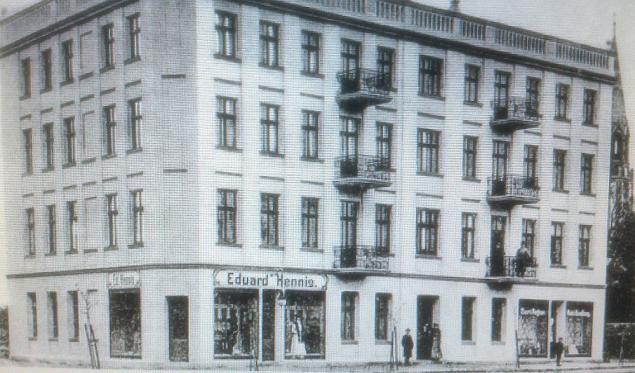
The village is clear, it is the same city Kaukemen
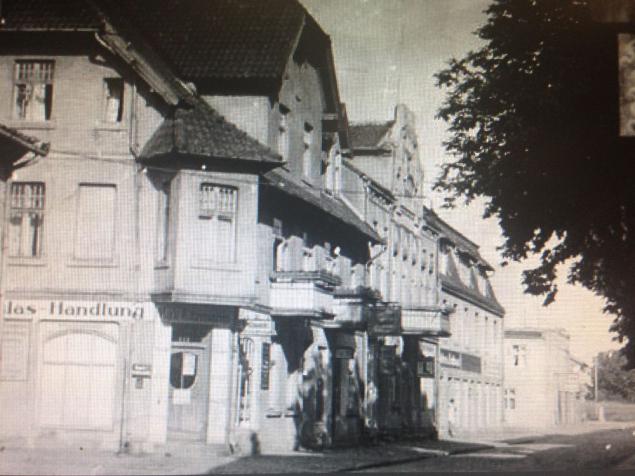
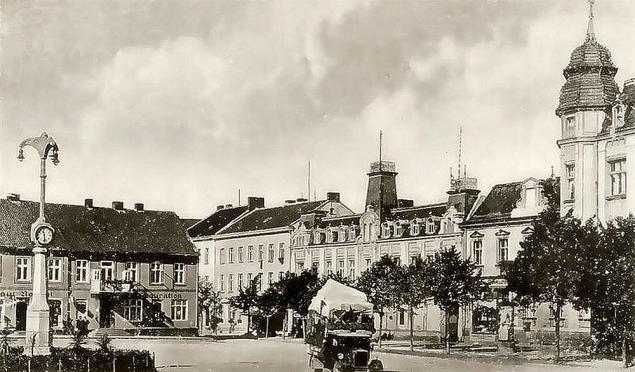
www.mk.ru/social/2015/04/02/byvshiy-nemeckiy-gorodok-ne-perezhil-rossiyskikh-metodov-khozyaystvovaniya.html
Even 75 years ago, the village was a Prussian city Kaukemenom with a 400-year history. It worked a few plants, a variety of shops, banks, restaurants, more than a dozen small hotels and one major five-star.
City Kaukemen went to the Soviet Union at the Potsdam Convention. And there was not one of the most war-torn. However, today the former splendor reminiscent of a centuries-old paving stones, old linden tree, elegant church that stands with no windows and no roof, so the house with tiled roofs. Today the village is clear - a dying town, the most hopeless throughout the Kaliningrad region. Residents flee from there, in the dilapidated houses wind howled ...

Half of the houses in the village. Clearly there are no roof. People live only in the first floor.
After the capitulation of Nazi Germany a large part of East Prussia, rich fertile land was transferred to the USSR. Including Kaukemen. The first thing the Soviets kicked out of all Germans. Towns and villages renamed: Königsberg became Kaliningrad Tilsit - Soviet, Heinrichswalde - Slavskoe, Kaukemen - clear. Then they began to settle in the city of immigrants from all over the Union.
From Kaliningrad to the Clear - 136 kilometers, getting there is difficult, it is necessary to go on three buses. The troop, berry, Krasnoznamenskaya ... Villages and towns flashed in front of me. Names do not tally with the scenery outside the window. Instead of the traditional Russian log houses with carved shutters - German houses with tiled roofs, neat alleys of old trees. Of the buildings of the Soviet era somewhere across typical Khrushchev, who are especially close look ugly with stone houses in the Prussian style, but concrete bus stops. Of the buildings of the new Russia - only roadside stalls. In almost all localities through which lay in my way clear, there is an old German pavers. Laid on the conscience, for centuries, it is in no way comparable with holes, somehow patched modern asphalt.
By the afternoon reached the Soviet (former Tilsit). Even 80 years ago, the Germans tied Tilsit and Kaukemen railway. But it was dismantled in the USSR, rails melted. Now the message - only car. The bus runs a couple of times a day.
Bathed in the warm March sun cobbled streets Clear meet me ringing emptiness. On the streets - not a soul. Old, beautiful church square. Judging by the photos of a century ago, her once crowded city dwellers, seething life, every Wednesday there were large agricultural fairs. Today, in 2015, I saw her only three guys. From vodka and seeds they kuchkovalis at the monument to Lenin, painted in gold color. This is the local Communist tried: set Ilyich earlier this year. Now political idol of the USSR with a smile looking at the crumbling house and moldy tile roofs.

Old Lutheran Church. Beginning of the XX century ... Photos from the personal archive.

... And today.
The building is an old gothic church heavily damaged. Not War - just him no one was watching. Church on this site was built back in 1549. Later it was rebuilt several times, until by 1702 has not begun construction of a stone building. The king of Prussia Frederick I allocated 225,000 bricks. Kirche put in 4 years. Today the church roof - solid holes, stairs to the bell tower, where once there were four bells, no more, and the organ was dismantled as early as 1947. Then claimed the shops (of seats in the church was 760, just as it was designed for 1,500 people). Past 30 years, the handiwork of men completed the wind, rain and snow. Someone dumped in a pile in the corner of old tires ...
Under Soviet rule in the church was the barn, then a warehouse. In the 80s there was a major fire - all burned. Since then, the 500-year-old Lutheran church is well worth it no one wants.
On the contrary - the once beautiful building of red brick with a "crown". Here the Germans was a parochial school. When the Soviet Union - a dairy farm. In recent years - pimped without a roof.
Surprisingly, in the village there are no clear structures of our times. All that is left over from Prussia. A number of houses, once tightly adjacent to each other, much thinned. And the remaining structure look like rotten teeth in old mouth. Shabby, with mold ... Modern paint and plaster peeling off, revealing signs in German. Here, it appears, was a bank here - shop car ... Former Bahnhofstrasse, now the street Tractor - one of the main streets, but in it there are only a couple of houses. But no! It is easy to include fantasy and imagine how luxurious look once these buildings ...
The locals are not so accustomed to visitors that saw me and immediately curiously peering out of windows:
- And you're not from zhilinspektsii? Come, I'll show you what we've got a nightmare!
Learning that the journalist, the woman immediately offers a "tour».
- Here we have a collective farm in the Soviet Union was communicating. Advanced, by the way, was the farm; over there, on the left, the stables were, they still Germans built. Already brick and left. And then there was the German school ... Oh, and the school was beautiful! I myself it comes to an end. Classes - huge, bright. But in '92 there was a fire. All burned to the ground. Gymnasium only stayed, he was in a separate building. The kids are still engaged in it. A new school was built, we are now here with pupils from all the surrounding villages, they are collected in a special school bus. If it were not for the school, there would be no one left at all. No work, nothing to live on. I interrupt what I can, keep the garden, in the fall selling potatoes. Eldest daughter went to live in Germany, sends a money sometimes. She, my Kate, when for the first time in Germany, then came home to clear, said to me: "Mom, what is the hole, it turns out, we live in ...»
In addition to the school burned down and a lot of other buildings. And no wonder: are heated by stoves in the winter, there is no gas in the city. Regular fires to put out no one: the fire station is not - it is also burned. There is not even a clear separation of the police - it is only in the neighboring Slavsk. Although the Germans were a fire squad and a police station, and even a brothel.
So that there is a brothel! By the early twentieth century in the German Empire these places were considered as protected, were climatic resort. Came here to relax, swim in the river Neman, hunting, fishing ... In the city, there were two luxury hotel, one of which - a five-star (from left magnificent buildings and stone), and another 10 smaller hotels.
Now it is hard to believe, but by the time when the city was taken by troops Kurkenezee 182nd Infantry Division of the 1st Byelorussian Front, there were 16 food stalls, 6 manufactory shops, bakeries 7, 7 of meat, 4 shoe, 3 shops Perfumery and haberdashery and pharmaceutical products, 6 joinery, manufacturing tinware 2, 3 building contractor, glassworks 2, 3 forge. In addition, there were several branches of banks, customs, court, mill, dairy plant, gas plant, textile factory ... And now all of the companies in the Clear left 4 shops and one cafe, which is open only on weekends.
- And what we buy something, the money no one - sigh local resident Alexander Starodubtsev. I met him at the grocery. He was born and raised in this city. Now working day after two Sovetsk. - Come on, I'll show you our home. He is here beside the street Postal. Our mnogokvartirnik, it turns out, is an architectural monument. It recently I accidentally found out when I went to swear on the roof. You see, we have changed a few years ago for some reason the roof. German old was - she did not flow. And this new - horror. It was demolished at the first strong wind ...
On the way, Alexander said that recently watched on television as the Governor of the Kaliningrad region reported to the President.
- He said that the average wage in the area - 28 thousand. I kind of money have never seen! I am working now in stock logistician. I receive so many that even ashamed to say. Sometimes I look photos of Clear hundred years ago. We on this do not even dream of! Here, where we now have a barn, on the second floor was a bakery. And on the first floor - a bakery ...
In the village there is a gas (at 5 km from the city, the river Neman in Lithuania it is, and Russian), there is no central sewage system, no roads are repaired, nothing is built. Although by 1924 it was electrified Kaukemene 95% of the homes and estates in the district. The city streets were also covered the latest at the time the way - with detectors dusk. In addition, in 1930, opened Tilzitshtrasse theater with 600 seats. Now there is no theater.
House on a street post, where he lives, Alexander, was once white. Now - dirty gray; visible at the end of a century-German inscription, advertises Konigsberg branch of the bank. In the attic there lives a local drunkard Sasha - put the iron bed, a TV tube. Around the dirt and stench. When I looked back, the owner-old man slept surrounded by stray dogs. Barking he woke up, opened one eye and Throaty shouted at me:
- In a coffin I will take pictures! ..
Neighbors told him that only 32 years old.

Why did the inhabitants of Prussia were both money and work, and food? Why East Prussia was an independent region of Germany and the Kaliningrad region became subsidized?
The same question is raised and ethnic inhabitants of these lands. Every year, usually in the summer, the German family, whose ancestors lived in these places come to visit their homeland. Find their home, watching the church ...
- How the Iron Curtain fell, so the Prussians were pulled here - says a resident of Clear Alexander burning. - They are immediately obvious: neat, come to rent a car, go in the house ... They are shocked by what he saw. Many cry, especially those who were taken away children - they remember how there was.
Now in this apartment three-storey building, with balconies offering a great view of the church, only three residential apartments. In the other - the devastation: windows smashed, plaster fell off, piles of garbage - so looks most apartments Clear. In order not settled homeless and accidentally set fire to the house, Alexander's it protects.
- If there lights up, then hell who come stew - he explains. - Why did not mend? Home something good and built to last. The walls are intact, is quite suitable and gender: a strong board, from walking not even bend. Even out balconies on the second floor of the German right. We write access wherever they can. Nothing helps!
To speak out in the yard, another resident a collapsed house:
- I was in the Baltic relatives - there the same time German house repaired. Well worth it. And we're not wanted ...
■ ■ ■
Director of the regional museum in the nearby district center with Clear Slavsk Svetlana Jackel says that they are working closely with the Germans.
- In Germany, there is a community of former residents Elhniderung - Tights Valley; they meet regularly, even publish the magazine of the same name. Every year they come at us in the museum exhibits bring. The Germans are very keen to preserve their heritage.
After dying village Clear neighboring town Slavsk (former Heinrichswalde) looks very lively. Although the city itself is much smaller and not so beautiful. But all functions, some of the buildings restored. First of all homes connected to gas. Together with the EU pave the public sewerage system. There was also hope to restore the church was facilities here.
Svetlana for me unlocks the padlock on the door of the church.
- A year ago, we were able to sign a lease with the ROC in the church building. Also managed to include this item in the Ministry of Tourism of the Russian Federation. Already there are design work - they have allocated 6 million rubles. On the first count it turns out that the restoration job needs about $ 100 million. The building of the former church, which was conceived to be a cultural center with a concert hall. Acoustics are smart, already tested by local musicians.
A year ago, at the entrance to set the memorial stone. It Slavskogo map area - the former leggings valleys, with names in Russian and German. And the inscription in two languages: "Unforgotten Motherland - East Prussia." This black stone set at its own expense a German, a former resident of Slavsk. His name was Hartmut Davidayt. But the man did not live up to the date of the monument, has died.
- We dream that our area has become a tourist attraction - says Svetlana plans. - Here we have something to show. Also - hunting, fishing. Monastery near chic, there already carry tours from Kaliningrad.
Svetlana told me that her mother in law moved to Slavskii area in 1947. And lived in Clear and in other cities and towns.
- He says he had a lot of luxury homes. And gorgeous parks, alleys ... People took the old German house. They were completely livable. Furniture, stoves, floors - everything was. But while all the German somehow not respected. Much burned, sold, tiles on the walls chipped and sold ...
A 5 km from the Clear River in the tiny village of Levoberezhny lives last veteran of the whole district - Kartseva Ekaterina Pavlovna. Recently, she has knocked 90 years. But she lives alone, holding a large garden. In the same village lives veteran sister - Olga Pavlovna. Hold two pensioners together, helping each other.
- Our family moved here in 1946. Oh, what a beauty, she was! I remember I went to the church and was dumbfounded: all in velvet, in gold. I am such and have never seen ... When moved here, you worked very hard. I was a schoolgirl, and after school we ran a grain sorting. There was no time even to sit down. And now no one works. Everything fell apart.
■ ■ ■
Only 70 years separate the city from the village Kaukemen Clear. But it is - an abyss. Our grandfathers shed blood here, fought for this fertile, rich and prosperous land. There is a mass grave of dead Soviet soldiers. All that got then in fierce battles, now is dilapidated, rotten, useless.
I have until the late evening wandering through the streets of the Clear - Kaukemena. All represented as they could walk here people drink coffee in the market square, there are fresh rolls from the bakery in the street Postal (formerly Lorkshtrasse). Could ride on the river Neman and waving from a boat on the shore of the Europeans. I have told friends: why do you need a weekend in Barcelona, go to clear! There's no worse.
After all is not lost: let half of the homes have collapsed, but that much is still left. Still alive ancient medieval streets, canals and bridges, still holding the church, not all people have left this place ... Just a decade all that stand no more. Unless a miracle happens.
REFERENCE "MK»
The first mention of Kaukemene dated 1532 year. Already in 1661 Kaukemen became a town with the right of the fairs. By the beginning of XX century the city was the largest settlement of the valley Elhniderung. A significant portion of the population and the surrounding area Kaukemena were ethnic Lithuanians. In 1938, Hitler issued a decree under which the settlements of East Prussia was renamed in the German way. Kaukemen became Kukernezee. But the new name of the city wore long. Kukernezee was taken Sovetskaya forces January 20, 1945. Since 1946, the city became a means to clear the cards as a settlement. Today, the population of the Clear - a little more than 1,000 people.

The village is clear, it is the same city Kaukemen


www.mk.ru/social/2015/04/02/byvshiy-nemeckiy-gorodok-ne-perezhil-rossiyskikh-metodov-khozyaystvovaniya.html
Tags
Clear village
town Kaukemen valley Elhniderung
USSR
Russia
East Prussia
Kaliningrad region
Potsdam Convention
See also
Space Cruiser
Ararat anomaly
10 inventions invented by women
Residents seriously got to teach the local 24-year-old racer for dangerous driving and clumsy.
German Notebook 1936
A day in the life of wildlife
Gone deep into the Earth
16 stunning facts about Sweden ... fabulous Fact number 9 - the mind boggles!
Max Skibinsky - No Russian, or what means the Russian-Ukrainian conflict to Silicon Valley
